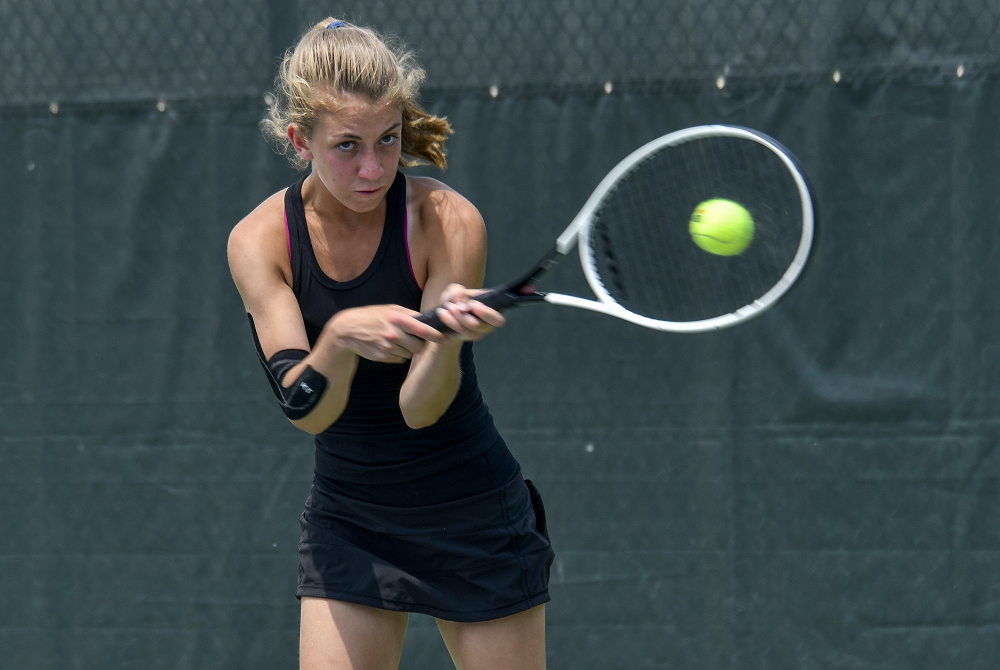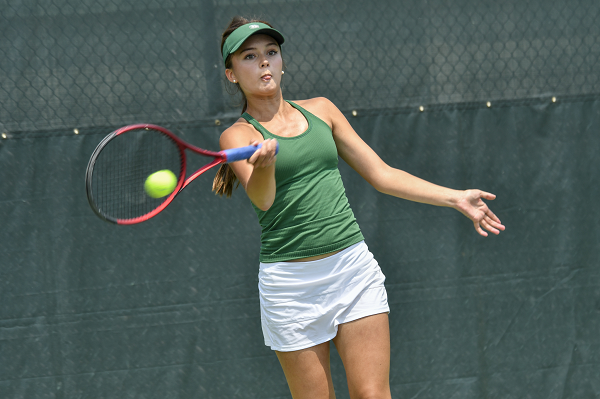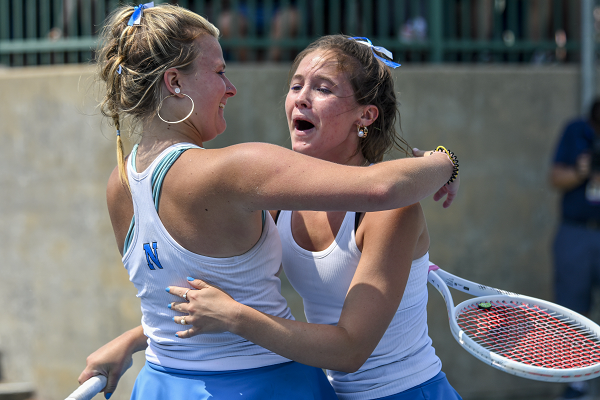
Michigan's Most Vital Prep Sports Moment
April 30, 2018
By Ron Pesch
Special for Second Half
Did you ever hear the one about an Ypsilanti lawyer, two girls from Ann Arbor – one 18 and one 17 – and a judge from Detroit?
I didn’t think so.
Well, pull up a chair. You might never look at a tennis ball, a pair of track cleats, or a softball in the same manner after this one.
Now this story goes back a bit. We’re talking 45, um, make that 46 years ago. It was handed down to me, so now I’m handing it down to you.
The girls, Cindy and Emily, had met at a tennis club when they were 11 or 12. Both were pretty good players who had done well at tennis tournaments before heading off to Huron High School. But there was concern that the girls wouldn’t have the chance to play truly competitive tennis while in high school. You see, like most public schools of the time, Huron had only one varsity tennis team, and that was filled with boys.
Contact was made with a friend and fellow tennis player to help guide things along when it came time to talk to the school board about the girls joining that team.
The conversation between that tennis friend – Larry the Lawyer – and the school board went pretty well. The board decided to let the girls play on the boys tennis team provided they could pass the tryouts. Well, as you’ve probably surmised, the girls did all right. With the blessing of Coach Jerry, it was decided Cindy and Emily would play No. 2 doubles for the River Rats.
 But as we all know, such decisions aren’t always met with cupcakes being served and happiness. People don’t always like change.
But as we all know, such decisions aren’t always met with cupcakes being served and happiness. People don’t always like change.
And that was pretty much the case here.
State officials didn’t much care for the idea. You see, when it came to interscholastic athletics, according to state rules established in 1967, girls couldn’t play on boys teams. Still, the Huron tennis team made the 60-mile trip up to Lansing on a Wednesday in April for a match with Lansing Harry Hill High School. Coach Jerry met with Hill’s coach, they shook hands, then Coach Jerry turned in his line-up card, to make things orderly and official.
Since there were girls names on the lineup card, not a single ball was served that day. Folks figured this was going to be the case. So the players and the bus turned around and headed back to Ann Arbor. Hill claimed a forfeited match because of that rule.
That set wheels in motion. Larry the Lawyer declared that this was a clear case of discrimination and a violation of Cindy and Emily’s right to equal protection under the 14th Amendment. With that, a lawsuit quickly was filed.
Now, they say that this was one of the first, if not the first lawsuits about such things. And you must remember this all happened back in early 1972, before the arrival of Title IX.
Turns out, Larry and the girls won their case. In Federal District Court, Judge Keith listened to what was said and issued a preliminary injunction allowing the girls to play. A little later in the week, Emily and Cindy won their first varsity doubles match hosted in Battle Creek, much to the dismay of their male opponents.
 The next month, the Michigan Legislature adopted a bill allowing girls to compete on male teams, but only in non-contact sports. In late May, the doubles team of Emily and Cindy defeated a doubles team from Harry Hill, 6-3, 6-1.
The next month, the Michigan Legislature adopted a bill allowing girls to compete on male teams, but only in non-contact sports. In late May, the doubles team of Emily and Cindy defeated a doubles team from Harry Hill, 6-3, 6-1.
Of course, as with many of these rulings, there was an appeal. And, as these things usually do, it took a while to move this along. But come January 1973, the U.S. Circuit Court down in Cincinnati agreed with Judge Keith and upheld the preliminary injunction. They, too, thought that girls should be able to participate in varsity interscholastic sports. The Circuit Court did narrow Judge Keith’s decision a bit, inserting the word “NON-CONTACT” into the ruling. Suddenly, it was officially OK for girls to play alongside the boys in sports like tennis, swimming, archery, golf, bowling, fencing, badminton, gymnastics, skiing, and track and field.
Now just because there’s a law, it doesn’t mean everyone’s abiding by it. It would take several more years and the threat or the filing of additional lawsuits against school districts and organizations to truly see things change.
Today, we don’t think twice when we take a seat at a girls softball game, track meet or tennis match. But a short time ago, such things simply did not exist for our daughters. The actions of two girls from Ann Arbor, an Ypsilanti lawyer and a judge from Detroit altered the athletic world – for the better.
 Lawrence Sperling’s lawsuit to support Cindy Morris’ and Emily Barrett’s quest to play high school sports was certainly a highlight of his career as an attorney. Lawrence and his wife Doris had sons who were outstanding tennis players. Michael and Gene were high-ranking players at Ann Arbor Pioneer during the 1970s. Gene played four years of tennis at the University of Minnesota and would later serve as Director of the National Economic Council and Assistant to the President for Economic Policy under Presidents Bill Clinton and Barack Obama. In 2012, he would write about his father and the landmark case for the White House.
Lawrence Sperling’s lawsuit to support Cindy Morris’ and Emily Barrett’s quest to play high school sports was certainly a highlight of his career as an attorney. Lawrence and his wife Doris had sons who were outstanding tennis players. Michael and Gene were high-ranking players at Ann Arbor Pioneer during the 1970s. Gene played four years of tennis at the University of Minnesota and would later serve as Director of the National Economic Council and Assistant to the President for Economic Policy under Presidents Bill Clinton and Barack Obama. In 2012, he would write about his father and the landmark case for the White House.
 Judge Damon Keith had been appointed to the bench of the United States District Court for the Eastern District of Michigan by President Lyndon Baines Johnson, in 1967. It was some four and a half years later that the Morris-Barrett complaint landed on his docket. A graduate of Detroit Northwestern High School, he is the father of three daughters. Keith would later be appointed to the United States Court of Appeals for the Sixth Circuit Court in Cincinnati by President Jimmy Carter in 1977. In 1995, he became the Senior Judge of that court. His amazing story was later told in a documentary “Walk With Me: The Trials of Damon J. Keith.”
Judge Damon Keith had been appointed to the bench of the United States District Court for the Eastern District of Michigan by President Lyndon Baines Johnson, in 1967. It was some four and a half years later that the Morris-Barrett complaint landed on his docket. A graduate of Detroit Northwestern High School, he is the father of three daughters. Keith would later be appointed to the United States Court of Appeals for the Sixth Circuit Court in Cincinnati by President Jimmy Carter in 1977. In 1995, he became the Senior Judge of that court. His amazing story was later told in a documentary “Walk With Me: The Trials of Damon J. Keith.”
According to media reports, Coach Jerry Shull had been trying to get girls eligible for the previous two seasons, but felt the ultimate solution was to have high schools around the state form all-girls varsity teams. He again served as varsity tennis coach in 1973 (of a team that featured 10 females) before stepping aside in 1974.
 Emily Barrett was a multi-sport athlete at Huron High School, competing with the Girls Athletic Club in swimming, field hockey and volleyball as well as tennis during this era of transition. During her senior year, the courts finalized their decision and she again played tennis for Huron. She’d move on to Denison University in Granville, Ohio, after graduation, where she played tennis and field hockey.
Emily Barrett was a multi-sport athlete at Huron High School, competing with the Girls Athletic Club in swimming, field hockey and volleyball as well as tennis during this era of transition. During her senior year, the courts finalized their decision and she again played tennis for Huron. She’d move on to Denison University in Granville, Ohio, after graduation, where she played tennis and field hockey.
A year older than Barrett, Cindy Morris had graduated from Ann Arbor Huron High School by the time the case was finalized. She headed off to the University of Michigan and then transferred to Carleton College in Northfield, Minnesota, where she played No 1. singles and doubles and twice participated in the National Collegiate Women’s Tournament. She later earned her Master’s degree in journalism from Northwestern University. As Cindy Morris, a sports journalist for the Cincinnati Enquirer, she recalled the words of Judge Keith for an article she was writing in late summer of 1978.
“Indeed, no male could have matched (the) soprano cries of joy when Judge Keith said, yes, go out and run and play and win and lose and laugh and cry and feel that special pride of playing for your school that boys in Michigan have always felt but you haven’t.”
The article was about a lawsuit originating in Yellow Springs, Ohio, where a girl was fighting to be allowed to compete in contact sports against boys.
 Ron Pesch has taken an active role in researching the history of MHSAA events since 1985 and began writing for MHSAA Finals programs in 1986, adding additional features and "flashbacks" in 1992. He inherited the title of MHSAA historian from the late Dick Kishpaugh following the 1993-94 school year, and resides in Muskegon. Contact him at [email protected] with ideas for historical articles.
Ron Pesch has taken an active role in researching the history of MHSAA events since 1985 and began writing for MHSAA Finals programs in 1986, adding additional features and "flashbacks" in 1992. He inherited the title of MHSAA historian from the late Dick Kishpaugh following the 1993-94 school year, and resides in Muskegon. Contact him at [email protected] with ideas for historical articles.
PHOTOS: (Top) The first high school match in 1972 for Ann Arbor Huron's Emily Barrett, left, and Cindy Morris was reported on for the Battle Creek Enquirer. (Top middle) The 1972 Ann Arbor Huron varsity tennis team, including Morris and Barrett. (Middle) The Ann Arbor Huron lineup card shows Barrett and Morris' names for a match against Lansing Harry Hill that was not played. (Below) A Lansing State Journal clipping tells of Hill electing to not play the match.

Seaholm Breaks Free From 3-Way Tie to Win 4 Flights, Clinch Team Title
By
Perry A. Farrell
Special for MHSAA.com
June 3, 2023
MIDLAND – A Lower Peninsula Girls Tennis Final has never finished with a three-way tie at the top – yet Birmingham Seaholm, Grand Rapids Forest Hills Northern and Grand Rapids Forest Hills Central all entered Saturday’s Division 2 flight semifinals with 22 points at Midland Tennis Center.
But with stellar play from its doubles teams, Seaholm won its first title since 2018, ending Forest Hills Northern’s Finals streak at three championships with 32 points to the Huskies’ 27. Forest Hills Central tied for runner-up, also with 27.
Seaholm’s first flight champion came from the No. 4 doubles tandem of junior Stella North and freshman Lucy Jen, the top seeds. They defeated Maggie Moog and Clare Knoester of Forest Hills Northern, 6-0, 6-4.
“We came out and dominated the first set,’’ said North. “In the second set, we had kind of a slow start.’’
“Then they adjusted to what we were doing, and we had to adjust,’’ said Jen. “We have a great tennis community at Seaholm. We’re a family and we have so many girls come out.’’
Added North: “I’m so happy for Lucy. She had to go through so much to make the team. We had tryouts and we played two days a week. We were the top team in our conference, so there was some pressure.’’
 Seaholm kept the momentum going winning the No. 2 doubles title with Katie Slazinski and Jenna Ting defeating Ava Hamilton and Lauren Jaklitsch of FHN, 6-3, 6-1.
Seaholm kept the momentum going winning the No. 2 doubles title with Katie Slazinski and Jenna Ting defeating Ava Hamilton and Lauren Jaklitsch of FHN, 6-3, 6-1.
“We had played them before with an alternate, so we hadn’t played that exact team,’’ said Slazinski. “I feel like we were in control. We were playing our way.’’
“We got up 3-0 in the first set, which was big,’’ said Ting. “We kind of dropped slightly, but we regrouped and got fired up.’’
Seaholm added another flight championship with the No. 3 doubles team of senior Sydney Fong and sophomore Jordyn Lusky downing Forest Hills Central’s Veronica Vincent and Ella Hunnewell, 6-2, 6-1.
“Jordyn has been great,’’ said Fong. “I wouldn’t have been able to do it without her. We played them before, so we knew what to expect. We had a plan. We took notes and executed what would thought were our strengths and their weaknesses. Our coaches do a great job.’’
Seaholm scored a championship at No. 2 singles as well, as Courtney Marcum outlasted Anna Dinsmore of Portage Central, 6-4, 2-6, 6-3, in that final.
Forest Hills Central junior Lily Ohlman, second-seeded at No. 1 singles, made school history in getting past top-seeded Helania Pietrowsky of Grosse Pointe North 6-2, 7-6 (7-2).
“I have been dreaming about this for a year,’’ said Ohlman, fighting back tears. “When she was having trouble keeping the ball in play, I just said keep the ball in play. In the second set, I started missing shots and my coach reminded me to just keep the ball in play. I just thank God.
“I’m the first (girls) singles champ in school history. This is so amazing.’’
 Portage Central freshman Adelie Chen captured the No. 3 singles title over Jada Josifovski of Seaholm, 7-5, 6-4.
Portage Central freshman Adelie Chen captured the No. 3 singles title over Jada Josifovski of Seaholm, 7-5, 6-4.
“After the semifinals, I didn’t think I could do it, but my teammates believed in me," said Chen.
In the battle of freshmen at No. 4 singles, FHN’s Harriet Ogilvie defeated Chloe Cox of FHC, 6-1, 6-2.
“I really like her as a player and a person,’’ said Ogilvie. “I had played her before, so I know her tendencies. I started executing what I needed to do and was able to keep the points coming and build some momentum. This is the end of a great season for me.’’
Forest Hills Northern’s No. 1 doubles team of Ryan Morey and Paige McKenzie kept Seaholm from sweeping doubles by defeating Tatum Hirsch and Ellie Wyzykowski 6-0, 4-6, 7-5.
First-year Huskies coach Steven Olson had to make a tough decision during a No. 2 singles semifinal, retiring his player Andrea Wang as she faced off with Marcum.
The two were tied at one set apiece – Wang won the first 6-1 and Marcum the second 7-6 – and Marcum was winning the third 5-1. But Wang’s right ankle was injured so badly she could barely move.
“She won the first set pretty quick,’’ said Olson. “She wouldn’t quit. I asked her to, and she wouldn’t. She’s a competitor, and she has a lot of pride. She’s only a sophomore.’’
PHOTOS (Top) Birmingham Seaholm’s Courtney Marcum fires a backhand during a No. 2 singles match Saturday at Midland Tennis Center. (Middle) Forest Hills Central’s Lily Ohlman volleys on the way to winning the No. 1 singles flight. (Below) Forest Hills Northern’s Ryan Morey and Paige McKenzie celebrate their championship at No. 1 doubles. (Click for more from High School Sports Scene.)

